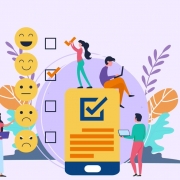Are Work Friends Invaluable?
Millions of people suffer from loneliness. More than 300 million people globally don’t have a single friend, according to Gallup data. And more than 20% of people don’t have friends or family they can count on whenever they need them, let alone any work friends.
The average person spends 81,396 hours — the equivalent of more than nine years — at work. “Americans are now more likely to make friends at work than any other way — including at school, in their neighbourhood, at their place of worship, or even through existing friends,” according to the Survey Centre on American Life.
So, people spend a lot of their lives at work, and that’s where they’re most likely to develop friendships. Yet of everything companies do to improve employees’ lives and promote their happiness, social well-being is the aspect they invest in least, according to a Gallup survey of CHROs of the world’s largest companies. Indeed, Gallup finds that globally, only three in 10 employees strongly agree they have a best friend at work.
Why Should Companies Care?
Despite claiming “people are our greatest asset,” many executives I’ve met expect employees to leave their personal lives at the door when they come to work. Yet Gallup’s data shows that having a best friend at work is strongly linked to business outcomes, including improvements in profitability, safety, inventory control, and employee retention.
Researchers at the University of Pennsylvania and University of Minnesota not only confirmed that close friendships increase workplace productivity, they also found out why — friends are more committed, communicate better, and encourage each other. And according to a global study by the International Social Survey Program (ISSP), “Interpersonal work relationships have a sizeable and significant positive effect on the job satisfaction of the average employee. Relationships rank first out of 12 domains of workplace quality in terms of power to explain variation in job satisfaction.”
If increased productivity, profitability, job satisfaction, and retention aren’t enough, Gallup’s latest findings show that since the start of the pandemic, having a best friend at work has an even greater impact on important outcomes — like workers’ likelihood to recommend their workplace, intent to leave, and overall satisfaction. With the unavoidable increase in remote and hybrid work, best friends at work have become lifelines who provide crucial social connection, collaboration, and support for each other during times of change.
Unfortunately, the pandemic not only exacerbated global loneliness, it also took a toll on workplace friendships. Among people working in hybrid environments, Gallup has seen a five-point decline in those who say they have a best friend at work since 2019.
Whether a workplace is fully in person, fully remote, or hybrid, a culture that prioritizes and encourages work friendships is good for employees and good for the bottom line. So how can managers create and maintain a friendship-friendly workplace that delivers measurable results while also helping to combat the global epidemic of loneliness? Here are some actions to take right now:
Establish a buddy system
Everyone needs a buddy, especially when they’re new to a company. Teaming up new hires with veteran employees can expedite onboarding and productivity. Workplace buddies not only give new hires tips like where stuff is and what the unwritten rules are, but they help them make connections with other people in the company. And some of these initial connections will almost certainly lead to long-term relationships.
The key to an effective buddy system is the frequency of the interactions. Microsoft found that when its new hires met with their buddy more than eight times in their first 90 days on the job, 97% said that their buddy helped them become productive quickly. But when new hires met with their buddy only once during the first 90 days, that number was only 56%.
Increase face time
Before the pandemic, work was a place where colleagues could get coffee, have lunch, and run into each other in the hallway for impromptu conversations. For people who started working remotely full time in 2020, one of the biggest changes was the sharp decrease in hours they spent engaging socially with work friends.
Building friendships requires talking to, seeing, and being with people. The best way to connect is to see each other — even if it’s on Zoom or FaceTime. But at a minimum, co-workers need to talk more and email less. Email will never live up to face-to-face dialogue. Plus, it’s much easier to misinterpret what someone means over email.
Business leaders need to set an example: Communicate in person more and email less. Further, leaders can encourage in-person interactions by revising expectations, establishing new cultural norms, and even updating workplace configurations. For example, encourage cross-training or have workers rotate job duties so they can collaborate with people in other areas of the company. Exposure to new people creates opportunities to meet new friends. Plan on-site social events, meetings, or lunches. Move people’s workspaces closer together. Where else do you spend so much time with people from different walks of life organized around a common mission? And where else are you so dependent on the efforts of others?
Jam constantly
When people share a common goal and achieve great things together, they form a connection. The joy is in working together to produce magic. Using the Beatles as an example of a high-performing team, The Economist states: “The Beatles love what they do for a living. When they are not playing music, they are talking about it or thinking about it. They do take after take of their own songs, and jam constantly.”
If you’ve ever been part of a collaborative “jam session,” you know the feeling. Your employees want to feel that too — the satisfaction and pride of creating something great while having fun. Best friends trust, accept, and forgive each other. And when they work together, Gallup research has shown that they are significantly more likely to engage customers and internal partners, get more done in less time, support a safer workplace, innovate and share ideas, and have fun on the job.
Don’t force it.
Thanks to the pandemic, the days of all-but-mandatory happy hours and “kindergarten offices” full of games and colourful toys designed to encourage workers to stay late for fun team-building activities might be behind us. According to Paul Lopushinsky, founder of Vancouver-based consultancy Playficient, “That culture isn’t really about fun; it’s about getting people to stay longer.”
You can mandate policies, training or timesheets, but you can’t make people be friends. You don’t want your employees to start hating the very thought of company parties. If your company still discourages workplace friendships despite the proven benefits to business outcomes, remember this simple premise: To ignore friendships is to ignore human nature. In the battle between company policy and human nature, human nature always wins. The evidence suggests that people will fulfil their social needs, regardless of what is mandated. Companies do far better to harness the power of this kind of social capital than to fight against it.
Given our current situation knowing that your colleagues or employees are best suited for this new scenario we find ourselves in. Finding the right talent, the best fit for the job and your organisation can be a very challenging task. It is now important to find out whether your managers or your team is well-equipped of working together from various locations. It requires deep knowledge of their personalities, strengths, weaknesses, interests, work style and other characteristics. Our technology and solutions will do the work for you, helping you discover if your people are resilient during times of hardship, if they are autonomous, if they are team players, without actual human contact. Given that our platform is cloud-based, everyone can use it from home as well. Humanity finds itself at a crossroad for various reasons now, why not help people discover and develop themselves from the comfort of their own homes?
Request a free demo:

Sources:
https://www.nytimes.com/2022/07/14/business/work-friends.html
https://www.forbes.com/sites/katecooper/2021/09/28/the-importance-of-work-friends/
https://www.wsj.com/articles/forget-work-friends-more-americans-are-all-business-on-the-job-11660736232











